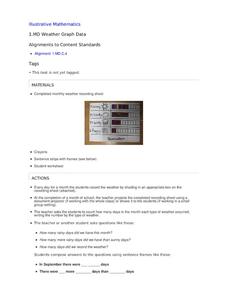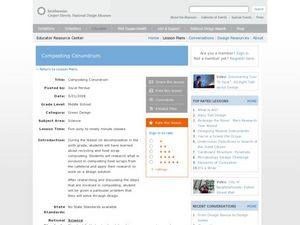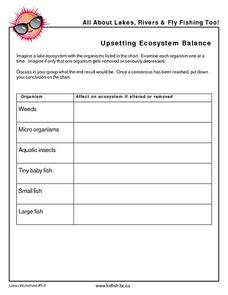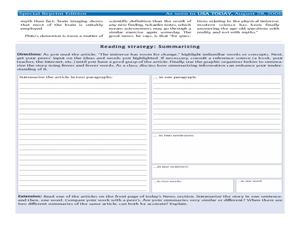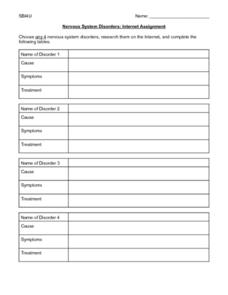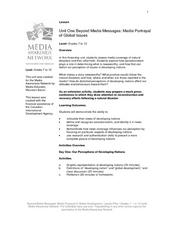Illustrative Mathematics
Weather Graph Data
Teaching young mathematicians about collecting and analyzing data allows for a variety of fun and engaging activities. Here, children observe the weather every day for a month, recording their observations in the form of a bar graph....
Newspaper Association of America
Using the Newspaper to Teach the Five Freedoms of the First Amendment
Of all the amendments found in The Bill of Rights, the First Amendment contains some of the most important freedoms for American citizens. A unit plan on the First Amendment features interactive lesson plans designed to teach about those...
Indiana Department of Education
Indiana K-12 Educators’ Resource Toolkit
Imagine a tool that magically engages readers in the classroom. A handbook for Indiana educators doesn't guarantee success, but it does offer a variety of strategies for teachers to try. The handbook opens with research-based theory...
McGraw Hill
Study Guide for Frankenstein
Help the class uncover the story of Frankenstein. Learners answer questions and complete activities to respond to the text Frankenstein as they read. Scholars learn new vocabulary, respond to personal and text-dependent questions,...
Curated OER
Composting Conundrum
Students research cafeteria composting. In this composting lesson, students design a vessel that would allow the cafeteria staff to collect food scraps for composting. Then students build a prototype and present it to the class. Lastly...
Curated OER
Upsetting Ecosystem Balance
In this ecosystem worksheet, students determine the affect on an ecosystem if different organisms are altered or removed. Students complete a graphic organizer.
Curated OER
Milkweed and Monarch Butterfly Mania
In this online/interactive worksheet comparing and contrasting Monarch and Great Spangled Fritillary Butterflies worksheet, students read an online comparison and contrast guide, use the graphic organizer, and record the similarities and...
Curated OER
Branches of Science Lesson Plans
Teachers can use branches of science lesson plans to get students excited about science careers.
Curated OER
The Universe Has Room for Change
In this universe and change worksheet, students read about the demotion of Pluto as one of the 9 planets as well as other changes in science. Students summarize their reading and identify unfamiliar words in the article. Students...
Curated OER
Animals, Animals, Everywhere
Fourth graders participate in a variety of activities dealing with animal characteristics and classifications in this multi-task lesson. They use graphic organizers, make booklets, and make models.
Curated OER
An Uplifting Experience
Fifth graders research and complete a graphic organizer about the principles of flight. In this aviation lesson, 5th graders experiment to understand the work of Daniel Bernouli and his discoveries about air pressure. Students create...
Curated OER
What's the Matter?
Learners explore matter. In this matter and technology instructional activity, students locate examples of solids, liquids, and gases inside and outside the classroom, and record their findings in a graphic organizer. Learners listen...
Curated OER
Classification of Intertidal Organisma
Students categorize animals. In this animal classification lesson plan, students group animals by their characteristics. Students break into groups and work together to classify the animals. Students fill out a graphic organizer with...
Curated OER
Nervous System Disorders
In this nervous system worksheet, students use the internet to research 4 nervous system disorders. Students write down the cause, symptoms, and treatments for each disorder researched. This worksheet is a graphic organizer.
Curated OER
States of Matter
In this matter activity, learners read a chart that uses water to show the three most common states of matter. Students review the properties of solids. This activity has 2 graphic organizers and 8 fill in the blank questions.
Curated OER
Physical and Chemical Changes
In this changes worksheet, students observe and record changes that occur in their every day life and classify these changes as either physical or chemical change. Students record their information in a graphic organizer.
Curated OER
Symbols and Formulae of Common Ions
In this ions worksheet, students complete a graphic organizer by filling in the missing names or symbols for positive and negative ions.
Curated OER
Ah Choo!
Students compare bacteria to viruses to find the differences. In this biology lesson, students research viruses they have been inoculated against, using the Internet. Students complete a graphic organizer of their research on common...
University of Georgia
Energy Content of Foods
Why do athletes load up on carbohydrates the evening before a competition? The lesson helps answer this question as it relates the type of food to the amount of energy it contains. After a discussion, scholars perform an experiment to...
Curated OER
Animals Galore
A well-designed lesson which covers the characteristics of the animals found in the six animal groups is here for your young biologists. In it, learners divide up into six groups; the amphibians, reptiles, mammals, birds, fish, and...
Curated OER
Beyond Media Messages: Media Portrayal of Global Issues
Take a close look at news reporting techniques and global issues. Begin by creating a graphic representation of developing nations and defining the term. After class discussion, the second day's activities pick up by deconstructing news...
Curated OER
Chameleons Are Cool!
Have your learners review what they know about camouflage using this lesson. Learners fill out a graphic organizer listing what they know or have questions about. This could be enhanced with the addition of a writing assignment in which...
Curated OER
KWL-- Topic: Butterflies
In this science worksheet, students use a KWL graphic organizer to prepare information before writing a report about butterflies. K= What I Know, W= What I Want to Learn, L= What I Learned.
Curated OER
KWL Chart: Living and Non Living
In this KWL chart worksheet, students fill in this graphic organizer about living and non-living things. Students complete 3 sections in the chart.


